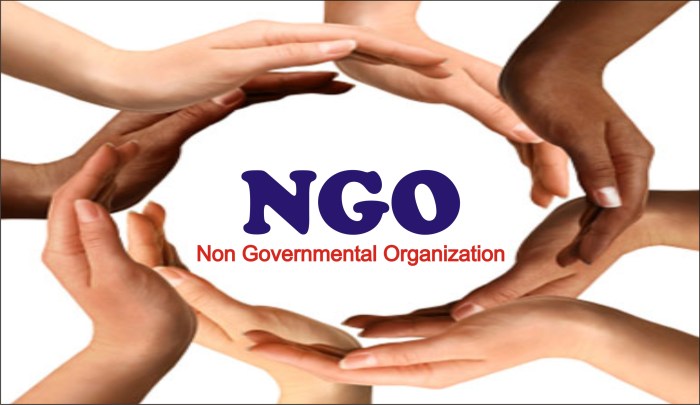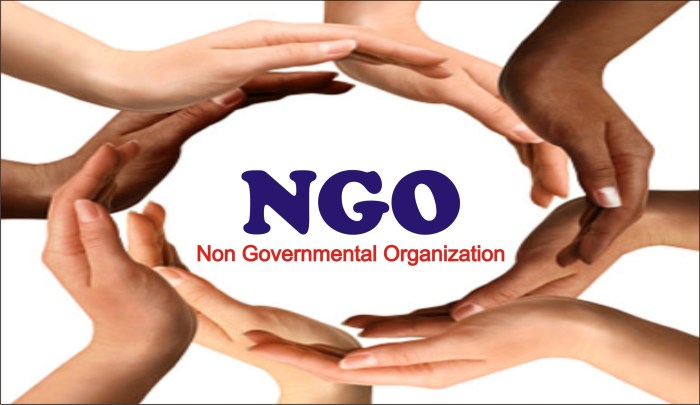
NGOs: Shaping Development Issues
Non governmental organizations on development issues – Non-governmental organizations (NGOs) play a pivotal role in addressing development issues worldwide. From tackling poverty and hunger to promoting education and healthcare, NGOs bring unique perspectives and resources to the table. Their impact spans across numerous sectors, impacting communities and shaping global development agendas.
Understanding the history, principles, and activities of NGOs is crucial for anyone interested in global development. This exploration delves into the diverse landscape of NGOs, highlighting their strengths, limitations, and the challenges they face in a constantly evolving world.
The Role of NGOs in Development

Non-governmental organizations (NGOs) play a crucial role in development work, addressing a wide range of issues and contributing to positive change in communities around the world. Their history, principles, and diverse approaches make them vital actors in the global development landscape.
Historical Evolution of NGOs in Development
NGOs have a long history of involvement in development work, dating back to the 19th century. Early examples include organizations focused on humanitarian aid, such as the International Committee of the Red Cross (ICRC), established in 1863. The post-World War II era saw a significant growth in NGOs, particularly those focused on development assistance.
The United Nations’ (UN) establishment in 1945 and its emphasis on international cooperation provided a platform for NGOs to engage in global development initiatives.
Key Principles and Values of NGOs
NGOs are guided by a set of principles and values that shape their operations and approach to development work. These principles include:
- Human Rights:NGOs advocate for and promote the protection of human rights, ensuring that all individuals have equal rights and opportunities.
- Social Justice:NGOs strive to address inequalities and promote social justice, working towards a more equitable distribution of resources and opportunities.
- Sustainability:NGOs emphasize sustainable development practices, seeking to create long-term solutions that benefit both current and future generations.
- Transparency and Accountability:NGOs are committed to transparency and accountability in their operations, ensuring that their actions are open to scrutiny and that they are responsible to their stakeholders.
- Community Participation:NGOs prioritize community participation in development initiatives, empowering local communities to take ownership and lead their own development processes.
Types of NGOs in Development
The development sector encompasses a diverse range of NGOs with different focuses, structures, and approaches.
Non-governmental organizations (NGOs) play a crucial role in addressing development issues, often working in partnership with governments and international institutions. However, their work is deeply intertwined with the broader political and economic context, and understanding the principles of neoliberalism, as outlined in a primer on neoliberalism , is essential for grasping the challenges and opportunities NGOs face in their efforts to promote sustainable development.
- International NGOs (INGOs):INGOs operate across multiple countries and often have a global reach. They typically focus on large-scale development initiatives, such as poverty reduction, education, and healthcare. Examples include Oxfam, Save the Children, and CARE International.
- National NGOs:National NGOs operate within a specific country and often focus on addressing local development challenges. They may work in areas such as environmental protection, human rights, or social welfare. Examples include the World Wildlife Fund (WWF) and Greenpeace.
- Community-Based Organizations (CBOs):CBOs are grassroots organizations that operate at the local level. They are often led by community members and focus on addressing specific needs and challenges within their communities. Examples include women’s groups, youth organizations, and farmer cooperatives.
Strengths and Limitations of NGOs in Development
NGOs bring unique strengths to development work, but they also face certain limitations.
NGOs working on development issues often face the complex reality of global debt, which can have a devastating impact on the most vulnerable populations, especially children. The ripple effects of debt can lead to reduced funding for essential services like education and healthcare, ultimately hindering a child’s ability to thrive and reach their full potential.
It’s crucial for NGOs to advocate for responsible debt management and policies that prioritize the well-being of children, as outlined in this insightful article on debt and the effect on children. By addressing the root causes of debt and its consequences, NGOs can play a vital role in creating a brighter future for generations to come.
Strengths:
- Flexibility and Adaptability:NGOs are often more flexible and adaptable than government agencies, allowing them to respond quickly to changing needs and circumstances.
- Innovation and Experimentation:NGOs are often at the forefront of innovation and experimentation in development, developing new approaches and solutions to address complex challenges.
- Local Expertise and Relationships:Many NGOs have strong relationships with local communities and possess deep knowledge of local contexts, enabling them to effectively tailor development initiatives to specific needs.
- Advocacy and Awareness Raising:NGOs play a crucial role in advocating for development issues and raising awareness among the public and policymakers.
Limitations:
- Funding Challenges:NGOs often face funding challenges, which can limit their ability to scale up their operations and achieve sustainable impact.
- Sustainability and Dependence:Some NGOs can become overly reliant on external funding, creating a risk of dependence and potentially hindering long-term sustainability.
- Lack of Coordination:The proliferation of NGOs can sometimes lead to a lack of coordination and duplication of efforts, which can hinder overall effectiveness.
- Accountability and Transparency:Ensuring accountability and transparency across the diverse range of NGOs can be challenging, particularly in complex and conflict-affected settings.
NGO Activities and Impact: Non Governmental Organizations On Development Issues
Non-governmental organizations (NGOs) play a vital role in promoting development and addressing global challenges. They operate across diverse sectors, implementing initiatives that aim to improve lives and create positive change. Their activities are multifaceted, ranging from providing basic services to advocating for policy changes and fostering community empowerment.
Examples of Successful NGO Initiatives
NGOs have a proven track record of implementing successful initiatives in various development sectors. Here are some examples:
- Education:The PrathamNGO in India has made significant strides in improving literacy rates, particularly among underprivileged children. Their innovative programs combine classroom teaching with community-based learning, engaging parents and volunteers in the process.
- Health: Médecins Sans Frontières (MSF), an international medical humanitarian organization, provides essential healthcare services in conflict zones and areas affected by natural disasters. Their teams of medical professionals deliver emergency aid, treat diseases, and offer essential medical supplies, saving countless lives.
- Agriculture: Heifer Internationalpromotes sustainable agriculture practices and empowers smallholder farmers in developing countries. They provide livestock, training, and access to markets, enabling farmers to improve their livelihoods and food security.
- Human Rights: Amnesty Internationaladvocates for the protection of human rights worldwide. They conduct research, raise awareness about human rights violations, and campaign for the release of prisoners of conscience. Their efforts have contributed to the advancement of human rights and the accountability of governments.
Non-governmental organizations (NGOs) play a vital role in addressing development issues, often working on the ground to provide essential services and support. However, the effectiveness of certain aid initiatives, such as food aid, can be debated, with some arguing that it can lead to unintended consequences, like food aid as dumping , which undermines local markets and disincentivizes local production.
NGOs are increasingly recognizing the need for more sustainable and locally-driven approaches to development, focusing on empowering communities and building resilience rather than relying solely on external aid.
Impact of NGOs on Local Communities and Development Outcomes
NGOs contribute significantly to local communities and development outcomes by:
- Providing essential services:NGOs often fill gaps in service delivery, especially in areas where government resources are limited. They provide access to healthcare, education, clean water, sanitation, and other essential services, improving the well-being of communities.
- Empowering communities:NGOs work to empower communities by fostering participation, building local capacity, and promoting self-reliance. They provide training, technical assistance, and support to enable communities to take ownership of their development.
- Advocating for policy changes:NGOs advocate for policies that promote development and protect vulnerable groups. They conduct research, raise awareness, and lobby governments to adopt policies that address social and environmental issues.
- Promoting sustainable development:NGOs play a crucial role in promoting sustainable development practices. They promote environmental conservation, climate change mitigation, and resource management, ensuring that development benefits current and future generations.
Challenges and Opportunities for NGOs in Achieving Sustainable Development, Non governmental organizations on development issues
NGOs face a range of challenges in achieving sustainable development:
- Funding constraints:NGOs often rely on external funding, which can be unpredictable and subject to political and economic fluctuations. This can hinder their ability to sustain long-term projects and achieve lasting impact.
- Bureaucratic hurdles:Navigating bureaucratic procedures and regulations can be time-consuming and resource-intensive for NGOs. This can slow down project implementation and limit their effectiveness.
- Lack of coordination:Collaboration and coordination among NGOs, governments, and other stakeholders are crucial for achieving sustainable development. However, fragmentation and lack of communication can hinder joint efforts.
- Security risks:NGOs operating in conflict zones or areas with high levels of violence face significant security risks. This can endanger their staff, limit their access to communities, and impede their ability to deliver services.
Despite these challenges, NGOs have opportunities to contribute to sustainable development:
- Innovation and technology:NGOs can leverage technological advancements to enhance their operations, reach more beneficiaries, and increase their impact. This includes using mobile technology for data collection, communication, and service delivery.
- Partnerships and collaboration:Building strong partnerships with governments, international organizations, businesses, and other NGOs can amplify their reach and effectiveness. This involves sharing resources, expertise, and knowledge to achieve common goals.
- Advocacy and policy influence:NGOs can play a critical role in shaping policies that promote sustainable development. This involves engaging in advocacy campaigns, conducting research, and influencing decision-makers.
- Community engagement:NGOs can empower communities by fostering participation, building local capacity, and promoting self-reliance. This involves working with communities to identify their needs, develop solutions, and implement projects.
Collaboration with Governments, International Organizations, and Other Stakeholders
NGOs collaborate with governments, international organizations, and other stakeholders to achieve development goals:
- Government partnerships:NGOs often work in partnership with governments to implement development programs and provide services. This can involve co-funding projects, sharing expertise, and collaborating on policy initiatives.
- International organizations:NGOs collaborate with international organizations such as the United Nations, the World Bank, and regional development banks to leverage resources, expertise, and networks. This can involve receiving funding, technical assistance, and support for advocacy efforts.
- Private sector engagement:NGOs increasingly partner with businesses to leverage their resources, technology, and expertise for development projects. This can involve corporate social responsibility initiatives, joint ventures, and supply chain partnerships.
- Civil society networks:NGOs often collaborate with other civil society organizations to share knowledge, resources, and best practices. This can involve forming coalitions, coordinating advocacy efforts, and supporting each other’s initiatives.
Funding and Sustainability of NGOs
NGOs play a crucial role in addressing development challenges worldwide, but their operations rely heavily on funding. Ensuring a stable and sustainable funding stream is essential for NGOs to achieve their objectives and make a lasting impact. This section delves into the diverse sources of funding for NGOs, the importance of financial transparency and accountability, and the challenges they face in securing long-term funding.
Sources of Funding for NGOs
NGOs rely on a diverse range of funding sources to support their operations and programs. These sources can be categorized into several key areas:
- Government Grants:Many governments provide grants to NGOs working in areas aligned with their development priorities. These grants can be substantial and provide a stable source of funding for specific projects or programs.
- Private Foundations:Philanthropic foundations, established by individuals or corporations, are a significant source of funding for NGOs. Foundations often focus on specific areas of interest, such as health, education, or environmental conservation.
- Corporate Social Responsibility (CSR):Corporations are increasingly integrating social responsibility into their business practices. This includes providing financial support to NGOs that align with their values and contribute to sustainable development goals.
- Individual Donations:Individual donations, ranging from small contributions to significant gifts, play a crucial role in funding NGOs. These donations can be made through direct giving, online platforms, or through fundraising events.
- International Organizations:International organizations, such as the United Nations and its agencies, provide grants and funding to NGOs for specific development projects and initiatives.
- Fee-for-Service Contracts:NGOs can generate income by providing services to governments, businesses, or other organizations. These contracts can involve implementing projects, conducting research, or providing technical expertise.
- Social Enterprises:Some NGOs operate social enterprises, which are businesses designed to generate revenue while achieving social or environmental goals. These enterprises can provide a sustainable source of income for the NGO.
Financial Transparency and Accountability
Financial transparency and accountability are fundamental principles for ensuring the integrity and effectiveness of NGOs. They build trust with donors and stakeholders and demonstrate responsible use of resources.
- Public Disclosure of Financial Information:NGOs should make their financial statements, including income, expenses, and assets, publicly available. This transparency allows donors and stakeholders to understand how funds are being used and to assess the organization’s financial health.
- Independent Audits:Regular independent audits by qualified professionals provide assurance that financial records are accurate and that funds are being used appropriately. These audits help to identify any potential irregularities or mismanagement.
- Internal Controls:Strong internal controls, including segregation of duties, authorization procedures, and regular reviews, help to prevent fraud and ensure the efficient use of resources. These controls should be documented and regularly reviewed.
- Donor Reporting:NGOs should provide regular reports to their donors, outlining project progress, financial expenditures, and any challenges encountered. These reports should be clear, concise, and provide a transparent account of how funds are being used.
Challenges to Long-Term Funding and Sustainability
Securing long-term funding and ensuring sustainability are ongoing challenges for NGOs. These challenges stem from various factors, including:
- Competition for Funding:The NGO sector is highly competitive, with many organizations vying for limited funding resources. This competition can make it difficult for NGOs to secure sufficient funding to support their programs.
- Fluctuating Funding Cycles:Funding cycles for NGOs can be unpredictable, with grants and donations often awarded on a short-term basis. This can make it difficult for NGOs to plan for the future and to invest in long-term initiatives.
- Donor Preferences:Donor preferences can shift over time, leading to changes in funding priorities. This can make it challenging for NGOs to adapt their programs and secure funding in line with evolving donor interests.
- Economic Downturns:Economic downturns can significantly impact funding for NGOs, as individuals and corporations may reduce their charitable giving during periods of economic uncertainty.
- Political Instability:Political instability can disrupt NGO operations and create challenges in accessing funding, particularly in countries experiencing conflict or humanitarian crises.
Framework for Assessing Financial Health and Sustainability
A comprehensive framework for assessing the financial health and sustainability of NGOs can help organizations identify areas for improvement and develop strategies for long-term financial stability. This framework should include:
- Financial Performance Analysis:Analyzing key financial ratios, such as liquidity, solvency, and profitability, can provide insights into the organization’s financial health and its ability to meet its financial obligations.
- Funding Diversification:Evaluating the diversity of funding sources can indicate the organization’s ability to withstand fluctuations in funding from any single source. A balanced portfolio of funding sources can enhance sustainability.
- Cost Efficiency:Analyzing the organization’s operating costs and identifying areas for cost savings can improve financial efficiency and maximize the impact of resources.
- Fundraising Capacity:Assessing the organization’s fundraising capacity, including its donor base, fundraising strategies, and outreach efforts, can identify opportunities for increasing revenue generation.
- Long-Term Planning:Developing a long-term financial plan that Artikels funding needs, revenue projections, and potential risks can help the organization navigate future challenges and ensure long-term sustainability.
The Future of NGOs in Development
The landscape of development is constantly evolving, presenting both opportunities and challenges for NGOs. To remain relevant and effective, NGOs must adapt to these changes, embracing innovation and collaboration to address emerging global issues.
Emerging Trends and Challenges
The future of NGOs in development will be shaped by several key trends and challenges. These include:
- Increased Complexity of Development Issues:The interconnectedness of global issues, such as climate change, inequality, and conflict, requires a more holistic approach to development. NGOs must collaborate across sectors and disciplines to address these complex challenges effectively.
- Shifting Power Dynamics:The rise of emerging economies and the growing influence of non-state actors are altering the traditional power dynamics in development. NGOs must navigate these shifts strategically, building partnerships with diverse stakeholders and engaging in collaborative governance.
- Increased Scrutiny and Accountability:NGOs are facing growing scrutiny from donors, governments, and the public. Transparency, accountability, and impact measurement are becoming increasingly important to ensure public trust and legitimacy.
- Funding Challenges:The global economic slowdown and competition for funding are making it more difficult for NGOs to secure resources. NGOs must diversify their funding sources, develop innovative fundraising strategies, and demonstrate a strong return on investment.
The Role of Technology and Innovation
Technology and innovation are playing a transformative role in development. NGOs can leverage these tools to enhance their effectiveness in several ways:
- Data Analytics and Impact Measurement:Data analytics tools can help NGOs collect, analyze, and measure the impact of their programs. This allows them to demonstrate results, improve program effectiveness, and make evidence-based decisions.
- Mobile Technology and Communication:Mobile devices and applications can be used to reach remote populations, provide information and services, and facilitate communication and collaboration. For example, NGOs can use mobile apps to deliver health education, track program participation, or collect data from beneficiaries.
- Crowdfunding and Online Platforms:Crowdfunding platforms allow NGOs to raise funds from a wider audience and build community support. Online platforms can also be used to share information, connect with volunteers, and advocate for policy changes.
- Artificial Intelligence and Machine Learning:AI and machine learning can be used to analyze large datasets, predict trends, and develop targeted interventions. For example, AI can be used to identify areas most vulnerable to climate change or to predict outbreaks of infectious diseases.
Key Areas for NGO Contribution to the Sustainable Development Goals
NGOs are well-positioned to contribute to achieving the Sustainable Development Goals (SDGs). Key areas of focus include:
- Poverty Reduction and Economic Development:NGOs can support microfinance initiatives, promote entrepreneurship, and provide skills training to help people lift themselves out of poverty.
- Health and Well-being:NGOs can provide healthcare services, promote health education, and advocate for policies that improve health outcomes.
- Education and Gender Equality:NGOs can provide educational opportunities, empower women and girls, and advocate for gender equality.
- Climate Action and Environmental Sustainability:NGOs can promote sustainable agriculture, protect biodiversity, and advocate for climate action.
- Peacebuilding and Conflict Resolution:NGOs can work to prevent and resolve conflict, promote reconciliation, and build peace.
Vision for the Future of NGOs
The future of NGOs in development is bright. By embracing innovation, collaboration, and a focus on impact, NGOs can play a critical role in shaping a more just and sustainable world. A vision for the future of NGOs might include:
- A global network of interconnected NGOs:NGOs collaborate across borders and sectors, sharing resources, expertise, and best practices.
- A data-driven approach to development:NGOs use data analytics to measure impact, improve program effectiveness, and advocate for evidence-based policies.
- A focus on innovation and technology:NGOs leverage technology to reach new populations, improve efficiency, and create new solutions to development challenges.
- A commitment to accountability and transparency:NGOs are transparent in their operations and accountable to their beneficiaries, donors, and the public.
- A focus on long-term sustainability:NGOs develop sustainable models that ensure long-term impact and reduce dependence on external funding.






